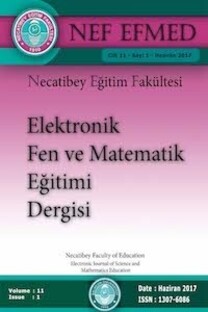Okul Öncesi Öğretmenlerinin Matematik Yeterliğiyle İlgili Görüşlerinin İncelenmesi
okul öncesi öğretmenleri, matematiksel yeterlilik, matematik öz-yeterliliği, matematik öğretme öz-yeterliliği
Examination of Preschool Teachers' Views on Mathematics Efficacy
preschool teachers mathematical efficacy, mathematics self-efficacy, mathematics teaching self-efficacy, teachers,
___
- Achurra, C., & Villardon, L. (2013). Teacher’ self-efficacy and student learning. The European Journal of Social & Behavioural Sciences, 22, 366-383. https://doi.org/10.1387/RevPsicodidact.6470
- Ay, M. (2005). The self-efficacy perception of primary school teachers about teaching of mathematics [Unpublished master’s thesis]. Hacettepe University.
- Aytaç, Y. (2020). Investigation of preschool teachers’ math anxiety effect on mathematics self efficiency [Unpublished master’s thesis]. İnönü University.
- Bandura, A. (2006). Guide for constructing self-efficacy scales. F. Parajes & T. Urdan (Ed.), In Self-efficacy beliefs of adolescents (307-337). Information Age Publishing.
- Baxter, P., & Jack, S. (2008). Qualitative case study methodology: Study design and implementation for novice researchers. The qualitative report, 13(4), 544-559. http://www.nova.edu/ssss/QR/QR13-4/baxter.pdf
- Biklen, S. K., & Casella, R. (2007). A practical guide to the qualitative dissertation: for students and their advisors in education, human services and social science. Teachers College Press.
- Brouwers, A., & Tomic, W. (2003). A test of the factorial validity of the teacher efficacy scale. Research in Education, 69(1), 67-79. https://doi.org/10.7227/RIE.69.6
- Bülbül, N. (2016). The analysis beliefs and self-efficacy levels of pre-school teachers regarding mathematics education according to some variables [Unpublished master’s thesis]. Gazi University.
- Creswell, J. W. (2012). Educational research: planning, conducting, and evaluating quantitative and qualitative research (4th ed.). Pearson.
- Çelik, M. (2017). Examination of the relationship between the preschool teachers’ attitudes towards mathematics and the mathematical development in 6-year-old preschool children. Journal of Education and Learning, 6(4), 49-56. http://doi.org/10.5539/jel.v6n4p49
- Demirtaş, H., Cömert, M., & Özer, N. (2011). Pre-Service Teachers’ Self-Efficacy Beliefs and Attitudes towards Profession. Education and Science, 36(159), 96-111. Retrieved from http://213.14.10.181/index.php/EB/article/view/278
- Ferla, J., Valcke, M., & Cai, Y. (2015). Academic self-efficacy and academic self-concept: Reconsidering structural relationships. Learning and Individual Differences,19(4), 499-505. https://doi.org/10.1016/j.lindif.2009.05.004
- Gavora, P. (2010). Slovak pre-service teacher self-efficacy: Theoretical and research considerations. The New Educational Review, 21(2), 17-30. Retrieved from https://www.researchgate.net/publication/287424468_Slovak_Pre-Service_Teacher_Self-Efficacy_Theoretical_and_Research_Considerations
- Henson, R. (2001). Teacher self-efficacy: Substantive implications and measurement dilemmas. Retrieved from https://files.eric.ed.gov/fulltext/ED452208.pdf
- Kahle, D. K. B. (2008). How elementary school teachers’ mathematical self-efficacy and mathematics teaching self-efficacy relate to Conceptually and procedurally oriented teaching practices [Unpublished doctoral dissertation]. The Ohio State University. Retrieved from https://etd.ohiolink.edu/rws_etd/document/get/osu1211122861/inline
- Miles, M. B., & Huberman, A. M. (1994). Qualitative data analysis: An expanded sourcebook. Sage.
- Oktay, A. (2000). Yaşamın sihirli yılları: Okul öncesi dönem [Life's magic years: Early childhood]. Epsilon Yayınları.
- Pajares, F. (1992). Teachers’ beliefs and educational research: Cleaning up a messy construct. Review of Educational Research, 62(3), 307-332. https://doi.org/10.3102/00346543062003307
- Ross, J., & Bruce, C. (2007). Professional development effects on teacher efficacy: Results of randomized field trial. The journal of educational research, 101(1), 50-60. https://doi.org/10.3200/JOER.101.1.50-60
- Sarama, J., & Clements, D. H. (2009). Early childhood mathematics education research: Learning trajectories for young children. Routledge.
- Schillinger, T. (2016). Mathematical instructional practices and self- efficacy of kindergarten teachers [Unpublished doctoral dissertation]. Retrieved from http://scholarworks.waldenu.edu/dissertations/2101/
- Siegle, D., & McCoach, D. B. (2007). Increasing student mathematics self-efficacy through teacher training. Journal of Advanced Academics, 18, 278-312. https://doi.org/10.4219/jaa-2007-353
- Sweeting, K. (2011). Early Years Teachers’ Attitudes towards Mathematics [Unpublished master’s thesis]. Queensland University of Technology.
- Şeker, P. T. (2013). Examination of effect on self efficacy and belief of preschool teachers about mathematics education on the math skills of 48-60 months old children [Unpublished doctoral dissertation]. Gazi University.
- Tran, N. A., Schneider, S., Duran, L., Conley, A. M., Richland, L., Burchinal, M. & Martinez, M. E. (2012). The effects of mathematics instruction using spatial temporal cognition on teacher efficacy and instructional practices. Computers in Human Behavior, 28, 340-349. https://doi.org/10.1016/j.chb.2011.10.003.
- Tschannen-Moran, M., & Hoy, A. W. (2001). Teacher efficacy: Capturing an elusive construct. Teaching and teacher education, 17(7), 783-805. https://doi.org/10.1016/S0742-051X(01)00036-1
- Ünlü, M., & Ertekin, E. (2013). The relationship between mathematics teaching self-efficacy and mathematics self-efficacy. Procedia - Social and Behavioral Sciences, 106, 3041 – 3045. https://doi.org/10.1016/j.sbspro.2013.12.350
- Yıldırım, A., & Şimşek, H. (2005). Sosyal bilimlerde nitel araştırma yöntemleri [Qualitative research methods in the social sciences]. Seçkin Yayıncılık.
- Yin, R. K. (2011). Applications of case study research. Sage.
- Zuya, H., E., Kwalat, S., K., & Attah, B., G. (2016). Pre-service teachers’ mathematics self-efficacy and mathematics teaching self-efficacy. Journal of Education and Practice, 7(14), 93-98. Retrieved from https://eric.ed.gov/?id=EJ1102977
- ISSN: 1307-6086
- Yayın Aralığı: Yılda 2 Sayı
- Başlangıç: 2007
- Yayıncı: Balıkesir Üniv. Necatibey Eğitim Fak.
Ortaokul Öğrencilerinin Bakış Açısından Matematik Öğretmenlerinin Uyarlamalı ve Duyuşsal Desteği
Türkiye’de Wattpad Kullanımı Nedenleri
Abdullah Ragıp ERSÖZ, Aysan ŞENTÜRK
Zeynep Büşra UZUN, Gülcan ÖZTÜRK
İlköğretim Otizmli Çocuklar İçin İnovatif Eğitsel Dijital Oyun Tasarımı
Abdullah ALAGÖZ, Ömer UYSAL, Nazenin ÖK, Yağmur SAKARYA, Gülhan GÜRSOYLAR
Öğretmen Adaylarının Dijital Materyal Yeterliklerinin Çeşitli Değişkenler Açısından İncelenmesi
Rumeysa BEDİROĞLU, Mutlu ŞAHİN
İlkokul ve Ortaokul Matematik Ders Kitaplarının Kök Değerler Açısından İncelenmesi
Ramazan DİVRİK, Mustafa Zeki AYDOĞDU
Ortaokul Öğrencilerinin Op Art ile Matematik Deneyimleri ve Yaratıcılık Becerileri
Rüveyda KARAMAN DÜNDAR, Şeymanur AKKAYA, İrem DERE, Nurfizan ERÇOBAN, Fadime AÇIKGÖZ
Okul Öncesi Öğretmenlerinin Matematik Yeterliğiyle İlgili Görüşlerinin İncelenmesi
